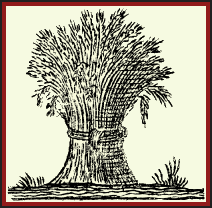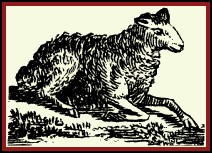

The Steward and His Office
| The management skills required to coordinate a great house and its staff are extraordinary. This list of duties is drawn from the Book of Rules and Orders prepared and enforced by Anthony Maria Brown, Viscount Montague, 1595. According to this rule, only the Clerke of the Kitchen and the Gentleman Usher come close to having this much responsibility. |
In matters foreign and without the house
- Make sure provisions are ordered and acquired. This includes beef, mutton, grain, livery, badges, wood, coals, wild fowl, wines, salt, hops (for brewing), spices, fruits of all sorts.
- Make sure repairs are carried out as needed in any of his lordship's houses, both inside and outside, including maintenance of fences hedges, marshes, walls, ponds, etc.
- Distribute wages quarterly to household servants and other manor employees, and provide whatever each one is due in cash or in kind.
- Deliver money as appropriate to the:
- Clerke of the Kitchen for purchasing fresh supplies of anything not supplied by the manor
- Purveyors of beef and mutton
- Gentleman or Yeoman of the Horse for buying feed, equipment, and other necessaries for the stable.
- Granator for buying wheat or malt, as needed
- Clerke of the Kitchen for purchasing fresh supplies of anything not supplied by the manor
- Collect bills and expense receipts from all these under-officers, review and enter them in his book of accounts (livery book).
- Ride out into the parks, pastures, marshes, and other grounds to see that they be not abused or disordered, either by his own bailiffs or anyone else.
- Support the Bailiff of Husbandry in his efforts to carry out his lordship's orders.
- Arrange to sell the hides, skins, horns, wool, etc of any sheep or oxen slaughtered for the table.
- Arrange to dispose of the tallow from such sales, keeping part to make candles and rush lights, part for use in the kitchen, and the rest to sell.
- Get a receipt from anyone to whom money is paid out, all to be filed against the annual audit.
- Sign off the livery book for all monies received from his lordship to pay household expenses, each entry to be dated with name of the person paid, location, and nature of the expense.
- Once a month, report to his lordship with the livery book for review, and once a year to the Auditor.
![]() Household Management
Household Management
![]() Staffing a Great Household
Staffing a Great Household
![]() The Steward in Matters Domestical
The Steward in Matters Domestical
![]() Paying the Servants
Paying the Servants
![]() Dinner at Cowdray House
Dinner at Cowdray House





24 June 2005 pkm
